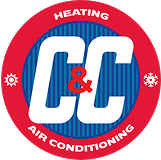Indoor air quality issues can negatively affect asthma sufferers, but many people in Greater Metro Detroit have turned to C & C Heating and Air Conditioning for help. As an HVAC contracting team, we have seen plenty of cases where improvements to customers’ systems have relieved their asthma symptoms. Here is a look at how indoor air quality concerns can drive asthma issues and how HVAC services frequently reduce those problems.
Indoor Air Quality Factors That Affect Asthma
Several indoor air quality factors can drive asthmatic responses. The most obvious is airborne irritants that float into a person’s breathing passages and get asthma attacks going. In many cases, duct cleaning and air filtration can significantly reduce these irritants.
Another common issue is indoor humidity levels. Mold and dust mites often find humid environments to be ideal places to grow. Even a small uptick in humidity can be enough to tip the balance and cause mold spores to grow in a house. This can be one of the trickier issues because it can sneak up on you. Your home’s HVAC system may slowly decline in quality. As it does, its ability to keep the humidity level down can also decline. Consequently, the issue could sneak up on you over several years as the HVAC system declines.
Fluctuating temperatures can trigger asthma symptoms, too. Swings toward cold or hot can work up a person’s breathing issues. If the HVAC unit in a home lets the temperature swing too much, this can have an irritating effect. This is particularly true in buildings that have forced-air heating systems.
Outdoor air quality can affect indoor air quality, too. Pollen season doesn’t stop at the door just because you happen to be inside. The same goes for pollution. Even debris from leaves in the fall can drive asthmatic responses.
The time of day is a factor for some people. Medication cycles can leave them vulnerable at certain times. Also, the changing environment as evening turns to night can shift indoor air quality. Even moving from the living room to your bedroom to go to sleep can trigger an event by shifting you into a different microenvironment.
Poor air circulation is another problem. Volatile compounds may end up trapped inside of a home from activities like cooking or using chemicals. The lack of fresh air can irritate an asthmatic person’s airways.
How HVAC Helps
The good news is that there are numerous ways for you to use HVAC services to address indoor air quality and asthma concerns. Some solutions are straightforward, such as using improved air filtration to reduce the amount of irritants in the air. Others can be a little more complex, such as installing zonal air controls. Here is a breakdown of several HVAC solutions that may benefit individuals who suffer from asthma.
Filtration
One of the most logical solutions is to improve the air filtration in the HVAC unit. After all, the HVAC is pushing air around so filtering the air that’s cycling through it should clean up the air.
Notably, it isn’t always as simple as finding the strongest HEPA filter and installing it. Many HVAC units have limits on how much filtration they can withstand. If the wrong filters are running on a unit, it can cause the system to strain and fail sooner. However, you can add an air filtration unit as a separate system. It will clean the air and then feed it into the HVAC unit. Not only does this improve air quality, but it should also reduce the strain on the HVAC.
Typically, our HVAC technicians can also show you how to maintain the filter system. They can identify the appropriate replacement filters so you can buy them in the store or online. Likewise, they can show you how to access the unit, remove the old filters, and install new ones. If you’re uncomfortable with the work or unable to handle it, though, we can do the job.
Duct Cleaning
Ducts get dirty quickly, and C & C Heating and Air Conditioning recommends that individuals who have breathing concerns should schedule duct cleaning work at least once a year. This is especially important if you can’t state when was the last time that a professional cleaned your home’s duct system; you need to schedule a session. Cleaning the ducts removes one of the most common sources of irritants.
Duct cleaning also can give the technician a good idea of what’s going on in a house. If they see a lot of mold, for example, they might want to check how well the HVAC is dehumidifying the house.
Air Purification
Modern indoor air quality solutions go beyond filtering and cleaning. Ionization and the application of UV light can kill biological irritants in the air. Viruses, molds, and bacteria all die quickly with sufficient purification. Purifying the air before you breathe should significantly reduce the risk that something biological will irritate your airways.
Improved Ventilation
This can be a tricky problem in a region like Greater Metro Detroit where you can’t always just crack a window. During very hot or cold times of the year, the HVAC system can end up being the best source of ventilation. The ventilation setup has to not be leaky, though. One of our qualified HVAC technicians can configure the ventilation system to ensure that it has proper insulation and airflow. We also can filter the intake to deal with concerns like pollution.
Air Balancing
Unbalanced air in a home can lead to pockets of irritants in specific rooms. A room has an air balance issue if it doesn’t get the same HVAC airflow that other parts of the house do. You might notice that a particular room is always musty smelling or a bit cooler, for example. Balancing the airflow throughout the house can minimize the risk that a specific room will become the one that always triggers a reaction.
Zonal HVAC Controls
Controlling the HVAC by zone in a house is both convenient and beneficial. If someone has asthma symptoms at bedtime, they might need to create a better zone in their bedroom. Installing a zonal control system ensures that a particular room has good indoor air quality when you need it. Setting the right temperature before you go to bed may prevent or at least mitigate nocturnal issues.
You also might want zonal control if you’re worried about a specific family member, such as a child with asthma. The control system will allow you to monitor and adjust the conditions in their personal space, reducing the potential for irritation.
C & C Heating and Air Conditioning has served Greater Metro Detroit for decades. In addition to managing indoor air quality issues that can affect asthma, our qualified technicians handle many heating, cooling, and ducting needs. Our team has the training required to work on systems from big names in the business like Lennox, Carrier and Trane. We deal with installations, repairs ,and maintenance, too.
Specials are available, and qualified customers should ask about financing. Contact C & C Heating and Air Conditioning now if you’re concerned about HVAC performance or indoor air quality in a home in Greater Metro Detroit.






